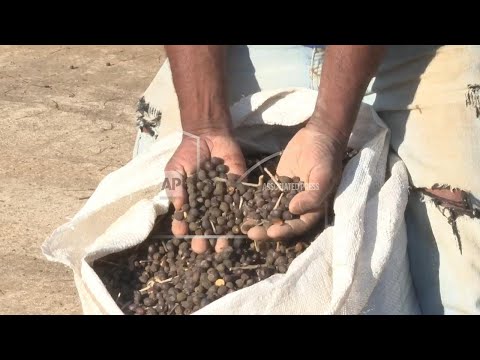(21 Jul 2025)
RESTRICTION SUMMARY:
ASSOCIATED PRESS
Varre-Sai, Brazil – 17 July 2025
1. Various of coffee plants laden with ripe beans
2. Various of farmers harvesting coffee beans
3. Various of José Natal sifting coffee beans
4. Various of Natal holding coffee beans from a sack
5. SOUNDBITE (Portuguese) José Natal da Silva, coffee producer:
"We had high expectations until about a month, 15 days ago, with very high hopes of having a good harvest, getting a good price, having a good coffee crop, and suddenly, out of nowhere, a bomb exploded and we were left not knowing who to talk to."
ASSOCIATED PRESS
Varre-Sai, Brazil – 18 July 2025
6. Aerial of coffee beans drying at a farm ++MUTE++
7. Marcio Vargas raking coffee beans under the sun
8. Close up of coffee beans drying
9. Wide of Vargas spreading coffee beans under the sun
10. SOUNDBITE (Portuguese) Marcio Vargas, coffee producer:
"I think that these tariffs are happening due to a political issue, and we here at the bottom (of the pyramid), we’re going to suffer the consequences, right? And the American consumer at the end will also have to pay more, and we will also have to reduce our margins to address political problems that are not our concern. We don’t understand."
11. Various of coffee plantations
12. Coffee beans drying in the sun
13. Large bags of coffee beans
14. Close up of coffee beans
15. Worker packaging coffee
ASSOCIATED PRESS
Varre-Sai, Brazil – 17 July 2025
16. Mid of coffee being poured through a traditional filter
17. Fernanda Marçola preparing coffee
18. SOUNDBITE (Portuguese) Fernanda Marçola, coffee producer:
"How can we buy the products that our crops need, and also in our home, with our family, with those around us. All of this leaves us with our hearts in our hands. We still don’t know what might come our way."
19. Aerial of coffee plantation ++MUTE++
STORYLINE:
When President Donald Trump announced a 50% tariff on Brazilian imports to the United States, coffee producers from Varre-Sai, a small city in the north of Rio de Janeiro’s state, saw their expectations for this year’s harvest clouded by uncertainty.
Small producers around the region, responsible for roughly 30% of the state’s coffee output, had to quickly adapt to the foreign trade market unpredictability, letting go the workforce hired for the harvest and hold exports as there are no guarantees that their product will reach the U.S.
"We had high expectations until about a month, 15 days ago, with very high hopes of having a good harvest, getting a good price, having a good coffee crop, and suddenly, out of nowhere, a bomb exploded and we were left not knowing who to talk to,” José Natal da Silva, a coffee producer in Varre-Sai, told the Associated Press.
Brazil supplies about 30% of the coffee consumed in the United States, making it the country’s top coffee supplier.
The U.S. imported over $1.6 billion in Brazilian coffee last year, according to trade data.
Marcos Matos, executive director of Cecafé, Brazil’s coffee exporters council, said the initial 10% tariff imposed by Trump in April was not as catastrophic as some of Brazil’s competitors faced even higher rates.
Vietnam, for example, began with a 46% tariff, now reduced to 20%. He sees the proposed increase to 50% as a serious escalation.
American consumers may also feel the impact.
With global coffee stocks already low, the tariff could push retail prices higher, hitting an industry that relies heavily on Brazilian supply for volume and consistency.
AP video by Mario Lobão
Find out more about AP Archive: http://www.aparchive.com/HowWeWork
Twitter: https://twitter.com/AP_Archive
Facebook: https://www.facebook.com/APArchives
Instagram: https://www.instagram.com/APNews/
You can license this story through AP Archive: http://www.aparchive.com/metadata/youtube/034724c99051426fb86f5dc843de17a0
Author: AP Archive
Go to Source
News post in July 26, 2025, 3:05 pm.
Visit Our Sponsor’s:
News Post In – News





